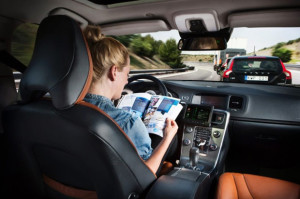 Self-driving cars used to be just an element of science fiction shows. Nowadays more and more automobile manufacturers experiment on vehicles that can move around safely while the driver is finishing his morning coffee or lunch. Google, GM and Nissan have their experimental models and driverless cars are expected on the road by the end of the decade. That is raising more and more questions on road regulations an insurance rules. All our rules about driving — from who pays for a speeding ticket to who is liable for a crash — are based on having a human behind the wheel. Who should be hold responsible if an autonomous vehicle is involved in a car accident? Every driver knows that even something as minor as a bended fender could be the cause of serious troubles.
Self-driving cars used to be just an element of science fiction shows. Nowadays more and more automobile manufacturers experiment on vehicles that can move around safely while the driver is finishing his morning coffee or lunch. Google, GM and Nissan have their experimental models and driverless cars are expected on the road by the end of the decade. That is raising more and more questions on road regulations an insurance rules. All our rules about driving — from who pays for a speeding ticket to who is liable for a crash — are based on having a human behind the wheel. Who should be hold responsible if an autonomous vehicle is involved in a car accident? Every driver knows that even something as minor as a bended fender could be the cause of serious troubles.
So far, only three U.S. states — California, Florida and Nevada — plus the District of Columbia have laws or rules spelling out how autonomous vehicles may be used on their roads. But even there the rules only work for testing the technology and a licensed drive is required behind the wheel. So far the National Highway Traffic Safety Administration (NHTSA) does not approve authorization of self-driving vehicles for purposes other than testing. But as self-driving cars become more common, there will be a flood of new legal questions needing answers and soon.
The signing ceremony for California’s self-driving-car, law, earlier this year showed that regulatory organs are not ready to answer these questions. When asked who is responsible when a driverless car runs a red light, Governor Jerry Brown answered “I don’t know — whoever owns the car, I would think. But we will work that out.”
„We will work that out” may not be good enough. But it’s a start. Self-driving cars should be legal — and they are likely to start showing up faster and in greater numbers than people expect.